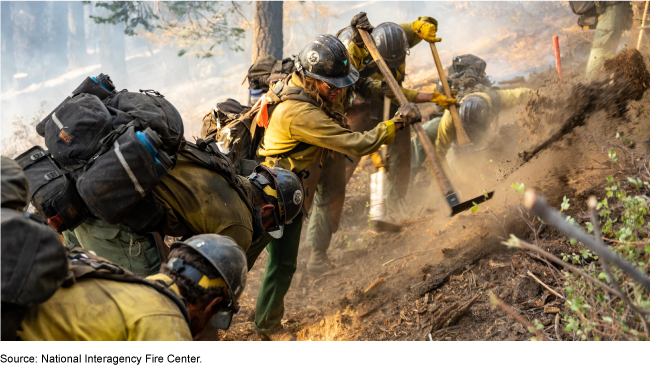Wildland Fire: Federal Agencies Face Barriers to Recruiting and Retaining Firefighters
Fast Facts
U.S. wildfires have grown more severe in recent years. The Department of Agriculture's Forest Service and 4 agencies within the Department of the Interior rely on about 18,700 employees to fight fires.
In this testimony, we discuss the federal wildland firefighter workforce. Low pay, career advancement challenges, poor work-life balance, and other factors have made it harder to get and keep these workers.
The Forest Service and Interior are taking steps to address these factors, but it is still too early to measure results.

Highlights
What GAO Found
In November 2022, GAO found seven commonly cited barriers to the recruitment and retention of federal wildland firefighters. (GAO-23-105517). At that time, the federal wildland firefighting workforce was composed of approximately 18,700 firefighters (including fire management and support staff) from the Department of Agriculture's Forest Service and from four agencies in the Department of the Interior: the Bureau of Indian Affairs, Bureau of Land Management, Fish and Wildlife Service, and National Park Service. The barriers GAO found were (1) low pay, (2) career advancement challenges, (3) poor work-life balance, (4) mental health challenges, (5) remote or expensive duty stations, (6) limited workforce diversity, and (7) hiring process challenges. This statement highlights findings related to three of those barriers.
Low pay. Forest Service and Interior officials and all 16 stakeholders GAO interviewed for the November 2022 report said that the pay for federal wildland firefighters is low. Officials and eight stakeholders also noted that the pay does not reflect the risk or physical demands of the work. Forest Service and Interior officials and four stakeholders GAO interviewed said that while steps to increase federal wildland firefighter pay were positive, they believed that pay still did not reflect the demands of the job and was not competitive with nonfederal entities. Officials said that they were looking at a long-term pay solution, such as establishing a higher pay rate nationwide for wildland firefighters.
Career advancement challenges. The agencies worked with the Office of Personnel Management (OPM) to develop a new occupational series for federal wildland firefighters aimed at better reflecting the duties related to fighting fires and providing a clearer path for firefighters to advance their careers. Implementation of the new occupational series is ongoing. The Forest Service and Interior agencies have the delegated authority to determine the work and grades supportable for their positions, including the firefighter positions under the new occupational series. As of August 2022, Forest Service and Interior officials said that they were developing the grade levels for the new occupational series, which is expected to take effect in 2023.
Poor work-life balance. Forest Service and Interior officials said that longer and more intense fire seasons have increased the number of times that firefighters are deployed during a year, which can make it difficult for firefighters to spend time with family or attend to personal matters. Officials and four stakeholders GAO interviewed for the November 2022 report said that the frequent deployments cause some firefighters to leave the workforce or take a break in service for family or personal reasons (e.g., to start a family or care for young children) but that the structure of the retirement system may affect their willingness to return later to firefighting. Two stakeholders said that federal agencies would be better positioned to recruit former firefighters back to service if firefighters were eligible to return to the special retirement system after a break in service. However, officials noted that eligibility for the special retirement system is governed by statute, so any change to eligibility requirements would need to be made by Congress.
Why GAO Did This Study
In recent decades, the size and severity of wildfires has increased across much of the United States, as has the length of wildfire seasons. For example, the total acres burned across the United States has doubled over the past 20 years, breaking records in many states. These increases are straining the federal wildland firefighting workforce.
This statement describes barriers to recruiting and retaining federal wildland firefighters and steps that agencies have taken to address those barriers. This statement is based on GAO's November 2022 report on this topic. To identify and describe these barriers, GAO reviewed laws, regulations, and program guidance and other agency documents. GAO also interviewed senior officials from the Forest Service and Interior, including both wildland fire and human capital managers, and from OPM. To gain a broader perspective on barriers, GAO also interviewed a nongeneralizable sample of 16 nonfederal stakeholders, such as nongovernmental organizations involved in firefighting issues.
For more information, contact Cardell D. Johnson at (202) 512-3841 or JohnsonCD1@gao.gov.
